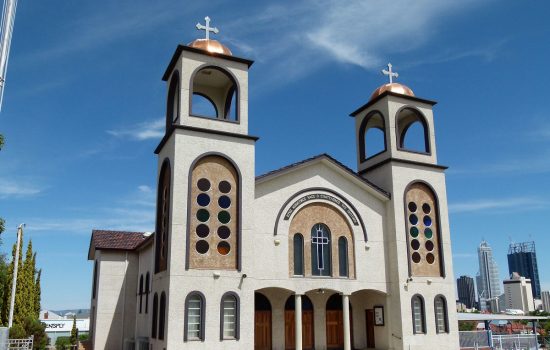We often hear the message of peace when Christmas draws near. The message is often drawn from popular Christmas Carols and a long history of Christian tradition. The message of peace brought to us through the birth of our Lord and Saviour Jesus Christ however, is very much misunderstood. The messages we hear during the lead up to Christmas fail to describe what this peace of God is truly about. There is the popular belief that this peace of God represents some form of greeting for each other during the festive season. The world speaks of vague, idealistic notions relating to world peace and harmony among the nations. This peace is popular because it communicates universal tolerance and emphasises world unity. Whilst this message may sound plausible it is empty and lifeless and fails to communicate the real peace that Christmas brings.
PEACE ON EARTH AND GOODWILL TOWARD MEN
The Angels praised God chanting, “Glory to God in the highest, And on earth peace, goodwill toward men!” (St Luke 2:14) These words of praise for God were a heavenly announcement of Christ’s coming. This heavenly message announces the Messiah, our Lord Jesus Christ, who brings salvation to the world.
The peace of Christmas is not about God bringing peace to the world. God the Father allowed it that humanity should be reconciled with Him through His Son Jesus Christ. This reconciliation between God and man is the real peace of Christmas. Those who belong to God are also reconciled to each other in Christ. This peace therefore is founded on love. Love for God and love for one another.
NOT PEACE BUT A SWORD
So having heard what the real peace of Christmas is about, what can we make then of Our Lord’s words when He said to His twelve disciples? For Jesus said to them “Do not think that I came to bring peace on earth. I did not come to bring peace but a sword.” (Matt. 10:34) Imagine this message appearing on a Christmas card.
The peace depicted by the commercial world is the exact opposite to that of Christ’s teachings. For Christ did not come to bring peace between those dwelling on the earth; He did not come to extend or guarantee the happiness of the temporal world, but to offer lasting peace between man and God. Only Christ who is God can offer this universal harmony and peace. It is not a peace that unites all dogmas, beliefs and faiths, but a peace offered to those of the earth who come to the knowledge of the truth through Christ and the Holy Trinity.
NO NEGOTIATION BETWEEN GOOD AND EVIL
The peace and reconciliation between man and God demands that all evil is rejected. Christ prepares us to enter the Heavenly Kingdom through His Church. The Church calls for us to reject “Satan and all his works, and all his worship and all his angels and all his pride” (Third exorcism prior to the Sacrament of Baptism in the Orthodox Church) and that we be joined to Him. In the Heavenly Kingdom evil cannot co-exist with good. Darkness cannot co-exist with light. Falsehood cannot co-exist with truth. These things which cannot co-exist with the good must be severed for all time with the sword. There can be no negotiation between evil and good. Christ’s peace allows that which was lost to be joined with Him, but it does not grant passage for evil.
Is there anyone or anything that comes before God in your life? Then it too must be severed. Christ taught His disciples accordingly “For I have come to set a man against his father, a daughter against her mother, and a daughter-in-law against her mother-in-law; and a man’s enemies will be those of his own household. He who loves father or mother more than Me is not worthy of Me. And he who loves son or daughter more than Me is not worthy of Me. And he who does not take his cross and follow Me is not worthy of Me.” (Matt. 10:35-38) The true disciple then, does not sacrifice faith for the love of others or material possessions. The love of God must always come first. The peace that God brings is not weak but strong, all powerful, uncompromising, compassionate and everlasting.
This is not to say that we do not pray for peace in the world and for all who live in it. We must always pray for peace. Peace however is only possible if we ourselves acknowledge and worship the true God and live according to His Will. It is with this in mind therefore that we say “In peace let us pray to the Lord.” (Divine Liturgy of St Chrysostomos).
Faith in God is vital for our spiritual life and well-being. Similarly a community or nation’s well-being is dependent on faith in God. Whole nations have been punished and destroyed because of their sinful neglect and indifference before God. There is a responsibility to live by the truth given to us, otherwise we will suffer punishment from God. All people and all nations are subject to this judgement.
PEACE I LEAVE WITH YOU
Our Lord said to his disciples “Peace I leave with you, My peace I give you;” (John 14:27) But he also added “not as the world gives do I give to you.” For the peace from above is beyond human understanding which God gives to those who love Him with all their soul. This peace is given because of this love and of the spiritual dangers and battles they have been fought in Christ’s name. Christ teaches us to have courage in all these afflictions we endure in the world. “In the world you will experience affliction” teaches Christ, “but have courage, for I have overcome the world.” (John 16:33) Though we face many spiritual dangers and temptations in the world we must not be afraid but have faith in Christ who gives us a powerful defence against all evil; he gives us peace from the turmoil of the world which threatens to snare and annihilate us, He protects us and saves us.
But in order for the soul to be at peace with God, it must also be at peace with all men even though this at times involves great suffering.
Fr Emmanuel Stamatiou


















